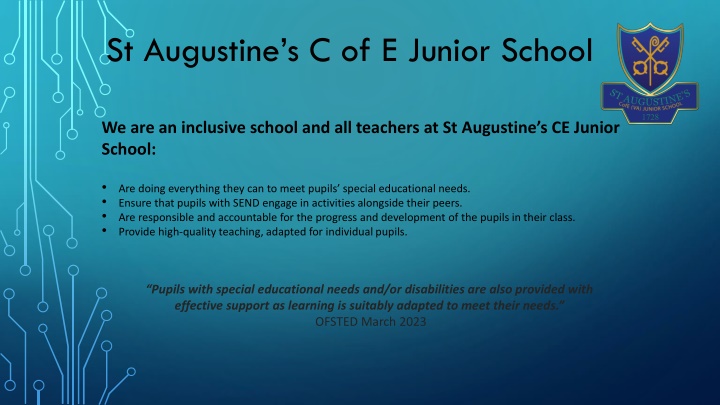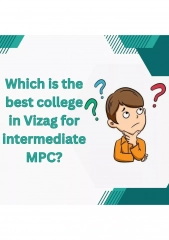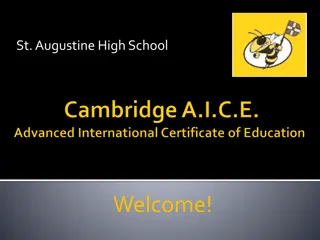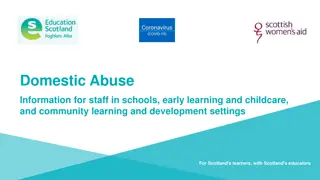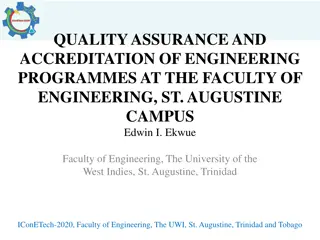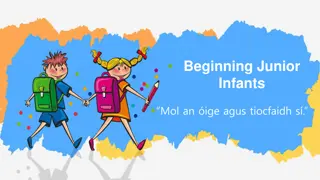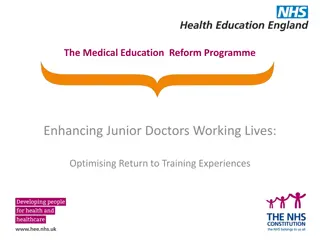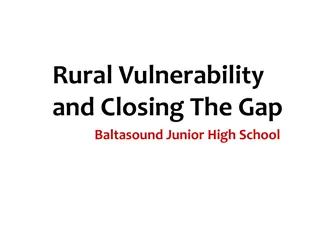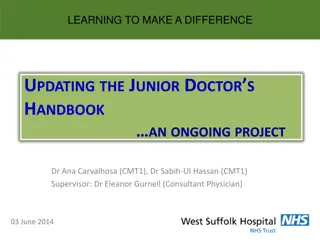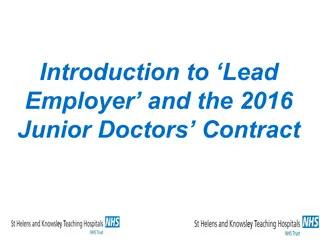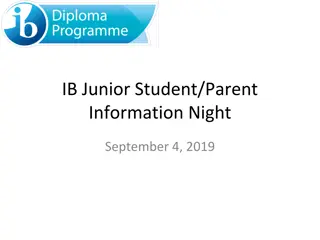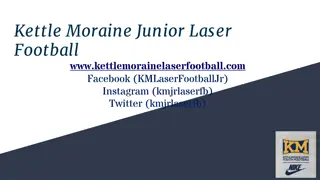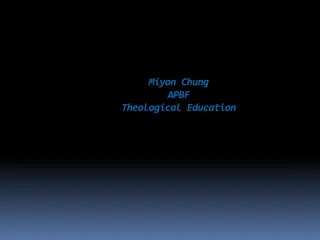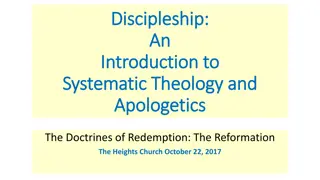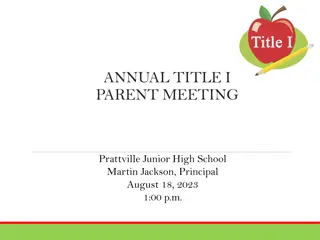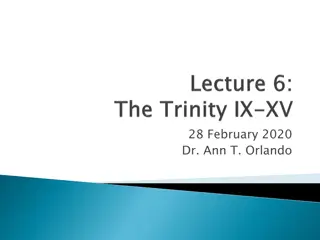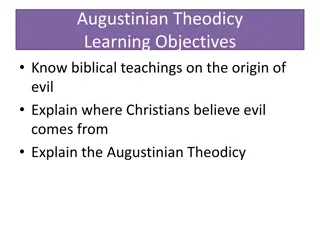Supporting Children's Development at St. Augustine's C.E. Junior School
St. Augustine's C.E. Junior School is committed to meeting pupils' special educational needs inclusively. Teachers provide tailored support, high-quality teaching, and necessary adjustments for individual pupils. The school offers pastoral support through a Christian ethos, themed activities, and sessions focused on spiritual, moral, social, and cultural development, fostering a well-rounded education for all students.
Download Presentation

Please find below an Image/Link to download the presentation.
The content on the website is provided AS IS for your information and personal use only. It may not be sold, licensed, or shared on other websites without obtaining consent from the author.If you encounter any issues during the download, it is possible that the publisher has removed the file from their server.
You are allowed to download the files provided on this website for personal or commercial use, subject to the condition that they are used lawfully. All files are the property of their respective owners.
The content on the website is provided AS IS for your information and personal use only. It may not be sold, licensed, or shared on other websites without obtaining consent from the author.
E N D
Presentation Transcript
St Augustines C of E Junior School We are an inclusive school and all teachers at St Augustine s CE Junior School: Are doing everything they can to meet pupils special educational needs. Ensure that pupils with SEND engage in activities alongside their peers. Are responsible and accountable for the progress and development of the pupils in their class. Provide high-quality teaching, adapted for individual pupils. Pupils with special educational needs and/or disabilities are also provided with effective support as learning is suitably adapted to meet their needs. OFSTED March 2023
Staff and Contacts SENDCo: Mr A Corbino acorbino@staugustinesjunior.net Alongside being Year 4 Class Teacher, Mr Corbino is our Special Educational Needs and Disabilities Coordinator (SENDCo) and liaises with staff, children, parents and external agencies to ensure support for our children is sought where required. He works with our teaching staff to ensure reasonable adjustments are made in the classroom and completes assessments and observations where required. Headteacher: Mr S Brunt Mr Brunt, our headteacher since January 2021, has worked as head of school in Lincolnshire and has many years of experience with working with SEND children. Mr Brunt supports the SENDCo in his role. He is happy to meet with parents and pupils and works closely with children and their families to give them the best experience at St. Augustine s. Learning Mentor: Mrs P Steel Mrs Steel is our afternoon Learning Mentor who is also training as an ELSA. She works 1:1 or in small groups with children outside during the afternoons. Through gardening, sensory activities and outdoor play, Mrs Steel helps children to work through their emotions, cope with their difficult days and talk about their worries. Home-School Liaison Officer: Mrs S Loizou Mrs Loizou is our Home-school Liaison Officer and leads on our Early Help Assessments. She works closely with parents to provide support and advice. Mrs Loizou also supports the SENDCo and works with children individually, in class or in groups to support them with their learning or with issues such as: worries, anger or self-esteem.
Wellbeing Coaching At St. Augustine s we started therapy sessions, run by Tamsin Moore- Jones, in September 2018 thanks to National Lottery funding. As this was highly successful, we now continue to fund this in school, with around 30% of our children using the service in recent years. Tamsin s support continued throughout lockdowns with 1:1 therapy sessions being provided remotely during the school year 2020-2021. Tamsin returned to school to run face to face sessions in 2021, working with children who feel anxious or struggle to control their emotions and many of our children have made excellent progress in these areas. She also provides staff training and runs children s mental health sessions for parents.
What pastoral support is provided? At St. Augustine s we continually support the children in their spiritual, moral, social and cultural development (S.M.S.C.). Our Christian ethos, themed days/weeks, daily collective worship and Religious Education sessions (R.E.) help to support the children in making the right decisions for them both morally and spiritually. Personal, Social and Health Education sessions (P.S.H.E.) also help to support the children in understanding social behaviour, exploring their own morality and teaching British Values. Where further support with social skills or emotional issues are needed, children may be chosen to take part in our self-esteem or social skills sessions. Mrs Loizou, Mrs Steel, Mr Corbino and class staff support pupils who are having social and emotional difficulties either in 1:1 sessions or group/paired activities. Where necessary, children may then be added for 1:1 or group sessions with our therapist.
OUR CORE OFFER All pupils are taught by their class teacher via excellent targeted classroom teaching which is also known as Quality First Teaching For your child this would mean: That the teacher has the highest possible expectations for your child and all pupils in their class. That all teaching is based upon building upon what your child already knows, can do and can understand. At times the teacher may direct a class based teaching assistant, to work with your child as part of normal working practice. Adapted activities and different ways of presenting information are in place so that your child is fully involved in learning in class. Specific strategies (which may be suggested by the SENCO or outside agencies) are in place to support children. Your child s teacher will have carefully checked on your child s progress and may decide that gaps in their understanding/learning requires some extra support to help them make the best possible progress. All children in school may access this as part of excellent classroom practice. Precision teaching for a smaller group of children may be used. This group, often called intervention groups by schools, may be run in the classroom or outside in a work area, run by a teacher or a teaching assistant who has had training to run these groups. If needed, pupils have access to the support available from outside agencies e.g. Speech and Language therapy, CAMHS, Occupational Therapy, Educational Psychology, Specialist Learning Teachers or Behaviour Support. The SEN Code of Practice (0-25) promotes the use of a graduated approach Assess, Plan, Do ,Review.
SEND pupils areincluded in all classroom activities. Their tasks will be prepared and marked by the Class Teacher or TA. They will be taught directly by the teacher wherever possible. We are fortunate to have a number of experienced teachers and teaching assistants on our staff and we share our expertise. Teachers may also seek advice from external agencies. We ensure that information about a child s Individual Education Plan or Education, Health and Care plan is shared and understood by teachers and all relevant staff who work with that child. We will include parents and the child in writing Individual Education Plans. Our school and staff aim to do everything to meet pupils special educational needs. All SEND children have the same right to facilities and extra curricular activities. We carefully plan for transition for children with SEND, for both in year transition and transitions to secondary school. Teachers plan, deliver then assess. If concerns continue then adapted activities will be prepared. The SENDCo will be informed and a cause for concern may be completed. We offer a variety of teaching styles, programs and strategies to enable pupils to achieve their full potential, this is our CORE offer available to all pupils. Parents can contact the Class Teacher before/after school or make an appointment to have an in depth conversation. Pupils are fully involved in their learning, being made aware of objectives and what they need to do to make progress. Assess Plan Review Do All pupils will receive Class teacher input via excellent targeted classroom teaching also known as Quality First Teaching For your child this would mean: That the teacher has the highest possible expectations for your child and all pupils in their class. Adapted activities will allow all pupils to make progress. The services we use to provide for and support our children include Specialist Teachers, Speech and Language, Occupational Therapy, CAMHS and The Educational Psychologist. Parents will be asked for permission before any agency becomes involved and they will kept informed of engagement in additional provision, receiving reports and updates. We encourage parents to become involved in the additional provision. Keeping in touch with the parent/carer is vital. You will be invited to contribute to your child s Individual Educational Plans at parents evenings. If concerns arise or needs change, then a meeting can be organised as appropriate. We monitor progress via termly tracking. Decisions will be made as to how best to move a child forward. Interventions are reviewed to monitor their effectiveness. We also observe teaching to ensure the needs of all pupils are catered for. Parents/carers find additional information in our SEND policy and also on the Peterborough Local offer.
POLICIES AND SUPPORT Policies relevant to SEND: SEN and Inclusion Policy Equality Policy Admissions Policy Complaints Policy SEN Code of Practice LA s Local Offer https://fis.peterborough.gov.uk/kb5/peterborough/directory/localoffer.page?familychannel=8 Support and advice: SENDIASS Peterborough and Cambridgeshire Tel: 0300 365 1020 Email: sendiass@peterborough.gov.uk
SEND AND PROVISION Class teachers, supported by the senior leadership team, make regular assessments of progress for all pupils. Where pupils are falling behind or not making expected progress given their age and starting point, extra support will be given. Special educational provision is education that is consistently additional to or different from that of others of the same age, i.e. provision that goes beyond the adapted approaches and learning arrangements normally provided as part of high-quality, personalised teaching. Once a potential SEND need has been identified, school takes action to remove barriers to learning and put effective special educational provision in place. This is SEN support which takes the form of a four-part cycle assess, plan, do, review. This is known as the graduated approach. There are 4 broad areas of SEND need. The following slides show what we offer at St Augustine s for each need.
Assess Plan COMMUNICATION AND INTERACTION Review Do Access to small group and/or individualised interventions. Access to technology (Chromebooks and iPads) to record their thoughts. Access to quiet areas our sensory room or reflection area. Flexible approaches to timetable. Modifications to lunch and break times. Enhanced access to additional aids, such as sensory boxes, visual timetables, ear defenders and work stations. Visual timetables in class. Emotion/feelings cards. Careful planning of transitions. Access to Speech and Language Therapist. Access to Educational Psychologist.
WHAT OUR CHILDREN THINK SUPPORT THEM Things on my desk. My rough book. Pictures of what we are going to be doing. I can have a break in class when I need it. We can work with our adults, the teachers are kind and help us. My feelings cards help me to talk.
Assess Plan COGNITION AND LEARNING Review Do Small group or individual intervention. Practical ways of completing tasks using manipulatives. Active lessons to engage participation. Increased adult support if needed. Rest breaks. Little Wandle Phonic Intervention PiXL Therapies used for reading, writing and maths. Additional maths programmes Times Table Rock Stars Increased access to ICT- e.g. Chromebooks, iPads and visualisers Adaptations to assessments to enable access e.g. readers, scribe, additional time. Curriculum will be adapted to meet the learning needs of the child. Modelling of different strategies in class Pre and post teaching of vocabulary and new concepts. Frequent repetition and reinforcement.
WHAT OUR CHILDREN THINK HELPS THEM Timers help me know how long I have. Working with short bursts then having a break. Teachers help with our work. Interventions with an adult to help with things I don t understand. Number lines. Times table squares Word banks. Displays in class help me. Working with an adult in a smaller group. I can use a Chromebook for longer pieces of work.
Assess Plan SOCIAL, EMOTIONAL AND MENTAL HEALTH Review Access to our sensory room TheNest . Time with our Learning Mentor. Time with our ELSA (Emotional Literacy Support Assistant) Sessions with our Wellbeing Coach. Behaviour Support Plans. Increased access to additional adults in the classroom. Visual timetables. Individual transition programmes in place to support the start to the day. Access to CAMHS, EHWS and Educational Psychologist as needed. Do
WHAT OUR CHILDREN THINK HELPS THEM All my friends help me. I feel happy. Housepoints and Dojos. Feelings cards. Meet and Greets help me, I feel safe. I like the well-being group - we learned how to calm down and talked about feelings. Working and talking with Mrs Steel.
Assess Plan SENSORY AND PHYSICAL Review Do Hearing Aids in classrooms where applicable. Staff trained in epilepsy and diabetes. Access to Speech and Language. Access to outreach from SEN nurse. Access to a specialist teacher/LSA for the hearing/visual impaired. Concrete apparatus available to support learning. Access to ear defenders where required. Therapy programmes delivered in school, designed by specialists e.g. Occupational Therapists, Physiotherapists etc. Adapted curriculum to enable full access e.g. alternative recording devices. Sensory circuits.
WHAT OUR CHILDREN THINK HELPS THEM Pencil grips help me write. Ear defenders squish my ears and make it better. I enjoy sensory circuits, they help me feel settled before I start my work. A time out space helps me if things get too loud.
How is SEND progress assessed and reviewed? Progress for children with SEND can be difficult to measure as this comes in many forms. We measure progress in reading, writing, maths and foundation subjects through using PIXL and children s learning is judged as: Working at Greater Depth (GDS) Working at Expected Levels (EXS) Working Towards Expected Level (WTS) Working Below Expected Levels (WB) For those working significantly below age expected, smaller steps of progress are judged against the Pre Key Stage Standards. https://assets.publishing.service.gov.uk/government/uploads/system/uploads/attachment_data/file/903553/2021_Pre-key_stage_2_- _pupils_working_below_the_national_curriculum_assessment_standard_PDFA.pdf As not all progress is academic, we follow the graduated approach and the four-part cycle of assess, plan, do, review through our IEPs. The class or subject teacher will work with the SENDCo to carry out a clear analysis of the pupil s needs. This will draw on: The teacher s assessment and experience of the pupil Their previous progress and attainment or behaviour Other teachers assessments, where relevant The individual s development in comparison to their peers and national data The views and experience of parents The pupil s own views Advice from external support services, if relevant.
All teachers and support staff who work with the pupil will be made aware of their needs, the outcomes sought, the support provided, and any teaching strategies or approaches that are required. We regularly review the effectiveness of the support and interventions and their impact on the pupil s progress. We evaluate the effectiveness of provision for pupils with SEN by: Reviewing pupils individual progress towards their goals each term Reviewing the impact of interventions termly Using pupil/parent questionnaires Monitoring by the SENDCo and the Senior Leadership Team Using provision maps to measure progress Holding annual reviews for pupils with EHC plans
Assess ALL STAFF AT ST AUGUSTINE S CE JUNIOR SCHOOL: Plan Review Do Use their best endeavours to ensure that the necessary provision is made for any individual who has SEN. Are responsible and accountable for all pupils in their class wherever or with whoever the pupils are working. The school regularly has CPD to improve outcomes for SEND pupils. Teaching Assistants are responsible for delivering specific intervention programmes eg PiXL therapies, precision teaching, phonic intervention, Beat Dyslexia etc. All trips, visits are risk assessed taking SEND needs into account. After school and enrichment activities are inclusive for all children.
Assess Plan REVIEW OF SEND Review Do Reviews of SEND pupils take place at least termly. Parents/carers are involved in the setting of clear outcomes for their child and the review of provision and progress. This occurs at least 3 times a year and more frequently as required. We hold parent consultation evenings in the autumn and spring terms. Parents receive a full report in the summer term.
TRANSITION Secondary school transition The majority of children, including those with SEND, attend a local mainstream school in Peterborough. These schools, including Nene Park Academy and Stanground College, have provision in place to support the needs of children with SEND. Nene Park Academy currently has an Enhanced Resource Provision (ERP) to support children with Autism. During year 6, we do our best to prepare our children for moving to secondary school. Provision includes: Lunchtime drop-in sessions with our school therapist around concerns that our year 6 children may have about transition. Group or 1:1 support for year 6 children who are struggling with transition worries. Organising additional visits for children experiencing anxiety about moving to a new school. Visits to and advice about possible special school placements for children with EHCPs.
TRANSITION What about special schools? In rare cases, during transition to secondary schools and where an EHC plan is in place, some parents may wish to apply to a special school. The following special schools in our local area are: Marshfields Medehamstede (Formerly City of Peterborough Academy Special School) Heltwate School Phoenix School Nenegate School Local Authority information on applying to a Special School can be found here: https://fis.peterborough.gov.uk/kb5/peterborough/directory/results.page?familychannel=8-6-13
LOCAL GOVERNING BOARD What input do the governors have? At St. Augustine s Junior School, our governors are involved in writing and reviewing our SEN policy. Our SEND governor is Kirsty Davis. The governors monitor the provision of resources for children with SEND and meet with the SENDCo to ensure that correct provision is in place.
Parent Views Adults have made sure that [my child] understands the tasks that have been set, in order to help [him] stay regulated. They have worked closely with the SENDCO and us as parents and have responded promptly to any issues that have arisen. Year 6 parent Thank you to everyone at the school for supporting our son this year and making reasonable adjustments to ensure our son feels calm and happy. Year 6 parent Amazing open line of daily communication and check ins (this in particular made the biggest impact), transparency on any issues as well as thoughtful and quick resolutions + reassurance, frequent updates on academic and social/personal progress within school, super approachable attitudes, clear sense of care and support for child's wellbeing and development, commitment to understanding child's needs as well as patient and creative ways to support those needs, genuine kindness. Year 3 parent They have worked so hard on helping her believe in herself and build up her confidence to know she can do her work. Whenever there has been a problem with [my child] they have been supportive. Year 6 parent School has gone above and beyond to support both children, but especially [my child] to give additional emotional support. Teachers are also extremely supportive to parents and very well balanced in their approach. Year 3 parent
